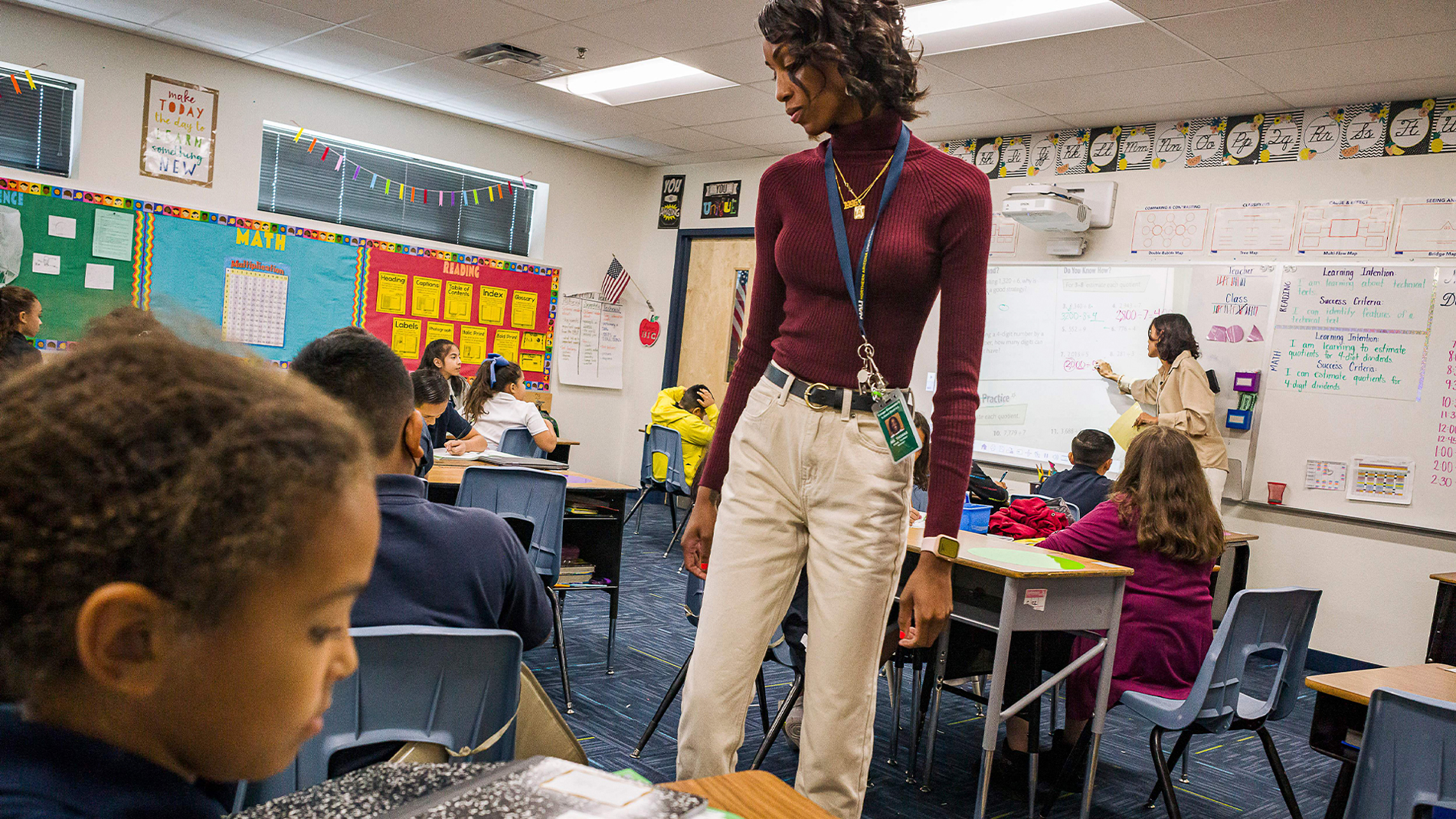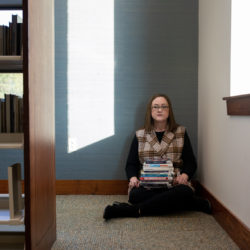USSA
A hotline to report teachers ratchets up tensions in US schoolsTeachers expressed confusion about the program and fears that they would be subject to investigations concerning 'inappropriate lessons'

OLIVIER TOURON/AFP VIA GETTY IMAGES
BY TJ L'HEUREUX
13 APRIL 2023
Teachers in Arizona were put on notice last month with the launch of the Arizona Department of Education’s “Empower Hotline” that encourages parents to report “inappropriate” lessons being taught in public school classrooms. In a state that ranks last in average cost-of-living adjusted teacher salaries in the U.S., where nearly a quarter of teaching jobs are unfilled, Arizona educators already face plenty of challenges. The new hotline is only adding to the pile.
What counts as inappropriate? An official announcement on the Department of Education’s website says that parents should report lessons that focus on “race or ethnicity, rather than individuals and merit, promoting gender ideology, social emotional learning, or inappropriate sexual content.” The hotline closely mimics a project that Virginia Governor Glenn Youngkin began in January 2022 and ended about eight months later due to receiving “little or no volume” of serious accusations, according to a Youngkin spokesperson.
The program was a key campaign promise of Arizona’s newly elected superintendent of public instruction, Tom Horne, whose platform focused on promoting right-wing notions of patriotism and attacking critical race theory. It is hard to come by an Arizona educator who would say that the scholarly theory — that race is a social construct used to oppress people of color — is taught in Arizona’s K-12 schools.
Horne insists otherwise and is quick to assert his dedication to studying U.S. history. “If I hadn’t been a lawyer, I would have been a history teacher,” Horne told me in an interview. “I’ve been reading history every day since I was 14.” Horne, who served as the superintendent of public instruction from 2003 to 2011, was the only Republican in Arizona to win a major statewide role last November.
His campaign website could be a case study in 21st century American far-right spin. Offering only dubious citations, the homepage sets up a mock polemic between Horne and his predecessor, Kathy Hoffman, in which he trots out right-wing, fear-mongering narratives about gender, race, slavery and capitalism in America, and of course about Covid-19. He attacks Hoffman for closing Arizona schools during the pandemic, offering social support for LGBTQ+ students and encouraging teachers to assign Nikole Hannah-Jones’ Pulitzer Prize-winning 1619 Project.
‘If they’re teaching about slavery, what are they supposed to say?’
The hotline was billed as a solution to these so-called problems. But Arizona public school teachers — the state employees whose work most directly affects student outcomes — have largely been left out of the discussion. What will the hotline mean for their work in the classroom? Teachers I spoke with expressed confusion about the program and fears that they would be subject to investigations concerning “inappropriate lessons.”
“Teachers are on a daily basis reaching out to us as union officers and asking if it’s okay to teach things in the approved curriculum,” said Kelley Fisher, who has taught kindergarten for 24 years. “If they’re teaching about slavery, what are they supposed to say? What can and can’t they say in their classrooms? They’re scared, and that should not be what happens in a classroom. Teachers should not be afraid to teach students to think for themselves.”
Others worry that the hotline will cause parents to complain to state officials rather than addressing their concerns directly with teachers or administrators, creating a dynamic that could foster distrust and make it harder to resolve conflicts.
“There are already very well established ways for parents to bring concerns directly to teachers, or, if necessary, the school principal or administration,” said Emily Kirkland, a spokesperson for the Arizona Education Association. “The hotline goes around those existing systems entirely and leaves teachers with no due process at all. It’s really poorly thought out.”
Amber Gould, who has taught English for 12 years in the Glendale Union High School District and serves as treasurer for the Arizona Education Association, was among several educators who said they had received no guidance about what to expect from hotline reports or how to respond to investigations. In an interview, Horne confirmed that the department has not issued guidance to teachers.
Horne is primarily concerned about parents who feel they aren’t listened to, not teachers, he told me. “This has been intended to be a way for parents to communicate with us,” he said. He acknowledged concerns about bypassing existing systems, adding that parents with complaints should go to teachers and principals first. “[The hotline] wasn’t intended to do that,” he said. With regard to the process, Horne said he believes that the department would call the principal first, then the teacher, who would be asked to stop teaching whatever had triggered the call. “If they persist, theoretically we would make a discipline referral to the state board,” he said.
For Kelley Fisher, the hotline is an effort that neither helps teachers nor ensures that students are receiving the best instruction possible.
“This hotline was about appeasing the people who got [Horne] elected,” said the veteran kindergarten teacher. “It’s not about transparency in the classroom, it’s not about making sure teachers are doing a good job.”
Attacking standard K-12 teaching techniques
Perhaps most worrisome to educators is Horne’s vilification of social emotional learning, a key method used by teachers to help students learn to communicate, solve problems and act with compassion toward others. With little concrete evidence, Horne has alleged that teachers are using social emotional learning techniques to disguise their teaching of critical race theory, echoing narratives from right-wing organizations like the Center for Renewing America.
13 APRIL 2023
Teachers in Arizona were put on notice last month with the launch of the Arizona Department of Education’s “Empower Hotline” that encourages parents to report “inappropriate” lessons being taught in public school classrooms. In a state that ranks last in average cost-of-living adjusted teacher salaries in the U.S., where nearly a quarter of teaching jobs are unfilled, Arizona educators already face plenty of challenges. The new hotline is only adding to the pile.
What counts as inappropriate? An official announcement on the Department of Education’s website says that parents should report lessons that focus on “race or ethnicity, rather than individuals and merit, promoting gender ideology, social emotional learning, or inappropriate sexual content.” The hotline closely mimics a project that Virginia Governor Glenn Youngkin began in January 2022 and ended about eight months later due to receiving “little or no volume” of serious accusations, according to a Youngkin spokesperson.
The program was a key campaign promise of Arizona’s newly elected superintendent of public instruction, Tom Horne, whose platform focused on promoting right-wing notions of patriotism and attacking critical race theory. It is hard to come by an Arizona educator who would say that the scholarly theory — that race is a social construct used to oppress people of color — is taught in Arizona’s K-12 schools.
Horne insists otherwise and is quick to assert his dedication to studying U.S. history. “If I hadn’t been a lawyer, I would have been a history teacher,” Horne told me in an interview. “I’ve been reading history every day since I was 14.” Horne, who served as the superintendent of public instruction from 2003 to 2011, was the only Republican in Arizona to win a major statewide role last November.
His campaign website could be a case study in 21st century American far-right spin. Offering only dubious citations, the homepage sets up a mock polemic between Horne and his predecessor, Kathy Hoffman, in which he trots out right-wing, fear-mongering narratives about gender, race, slavery and capitalism in America, and of course about Covid-19. He attacks Hoffman for closing Arizona schools during the pandemic, offering social support for LGBTQ+ students and encouraging teachers to assign Nikole Hannah-Jones’ Pulitzer Prize-winning 1619 Project.
‘If they’re teaching about slavery, what are they supposed to say?’
The hotline was billed as a solution to these so-called problems. But Arizona public school teachers — the state employees whose work most directly affects student outcomes — have largely been left out of the discussion. What will the hotline mean for their work in the classroom? Teachers I spoke with expressed confusion about the program and fears that they would be subject to investigations concerning “inappropriate lessons.”
“Teachers are on a daily basis reaching out to us as union officers and asking if it’s okay to teach things in the approved curriculum,” said Kelley Fisher, who has taught kindergarten for 24 years. “If they’re teaching about slavery, what are they supposed to say? What can and can’t they say in their classrooms? They’re scared, and that should not be what happens in a classroom. Teachers should not be afraid to teach students to think for themselves.”
Others worry that the hotline will cause parents to complain to state officials rather than addressing their concerns directly with teachers or administrators, creating a dynamic that could foster distrust and make it harder to resolve conflicts.
“There are already very well established ways for parents to bring concerns directly to teachers, or, if necessary, the school principal or administration,” said Emily Kirkland, a spokesperson for the Arizona Education Association. “The hotline goes around those existing systems entirely and leaves teachers with no due process at all. It’s really poorly thought out.”
Amber Gould, who has taught English for 12 years in the Glendale Union High School District and serves as treasurer for the Arizona Education Association, was among several educators who said they had received no guidance about what to expect from hotline reports or how to respond to investigations. In an interview, Horne confirmed that the department has not issued guidance to teachers.
Horne is primarily concerned about parents who feel they aren’t listened to, not teachers, he told me. “This has been intended to be a way for parents to communicate with us,” he said. He acknowledged concerns about bypassing existing systems, adding that parents with complaints should go to teachers and principals first. “[The hotline] wasn’t intended to do that,” he said. With regard to the process, Horne said he believes that the department would call the principal first, then the teacher, who would be asked to stop teaching whatever had triggered the call. “If they persist, theoretically we would make a discipline referral to the state board,” he said.
For Kelley Fisher, the hotline is an effort that neither helps teachers nor ensures that students are receiving the best instruction possible.
“This hotline was about appeasing the people who got [Horne] elected,” said the veteran kindergarten teacher. “It’s not about transparency in the classroom, it’s not about making sure teachers are doing a good job.”
Attacking standard K-12 teaching techniques
Perhaps most worrisome to educators is Horne’s vilification of social emotional learning, a key method used by teachers to help students learn to communicate, solve problems and act with compassion toward others. With little concrete evidence, Horne has alleged that teachers are using social emotional learning techniques to disguise their teaching of critical race theory, echoing narratives from right-wing organizations like the Center for Renewing America.
Related Articles

Missouri librarians are risking jail time – for doing their jobs

America’s culture warriors are going after librarians
Several teachers expressed confusion about the link between critical race theory and social emotional learning, which they say are completely different. Abby Knight, a kindergarten teacher in the Kyrene School District, said the current discourse has created a deep misunderstanding about what social emotional learning is.
“There is a level of disconnect when you’re not in the classroom and you’re not doing it,” she said. “SEL is made up of really basic concepts that, if you’re not an educator, you don’t realize are crucial to teaching young kids.”
She explained that you need to teach kids how to communicate effectively, problem solve, consider others and understand what constitutes an appropriate behavior for a given circumstance, in order to foster an effective learning environment.
“Learning really doesn’t take place unless there’s a lot of behavioral work that goes into a classroom,” Knight said.
Empowering pranksters while leaving teachers behind
What has the hotline actually achieved since its mid-March launch? It has seen plenty of action but almost no reports of “inappropriate” lessons. Instead, its staff have been bombarded by thousands of prank calls from outside Arizona and about 1,000 calls from within the state, the vast majority of which also came from pranksters. In an email, Arizona Department of Education spokesperson Rick Medina said that as of April 10, the department had received only a handful of calls that warranted investigation.
Horne said there was one serious hotline case he was aware of: “Someone called us about [a teacher] evangelizing in the classroom. We called the principal who said he was aware of it already, so we dropped it.”
Meanwhile, Arizona educators continue to face very real pressures that the hotline isn’t going to fix. The state is facing a critical shortage of teachers — one in five positions is unfilled — and wages haven’t kept pace with economic changes. Nevertheless, state-mandated responsibilities keep rising.
“People are leaving because it’s not feasible mentally or financially,” Knight said.
“It’s about the way teachers are being treated and it’s driving them out of the classroom,” Kelley Fisher said. “There are plenty of people in this state who are certified to be teachers, but they just don’t want to be teachers right now. It’s really sad.”
Amber Gould, who began teaching at the end of Horne’s last stint as the public schools superintendent, said she felt deja vu about his return to office. “I would hope that we’re able to have conversations with [Horne], because at the end of the day I hope that he wants to do what’s best for kids and not necessarily for his political talking points.”
It remains to be seen whether the hotline will fizzle out like in Virginia or lead to actual investigations into teacher conduct.
“I honestly feel like it’s more of a publicity stunt for Superintendent Horne and his office, but when the fight comes, we’re going to be ready,” Gould said. “We know our rights and we know that in the end, we’re going to do what’s best for kids.”
Support Coda

TJ L'Heureux is a freelance reporter and writer based in Phoenix.@tjlheureux0
No comments:
Post a Comment